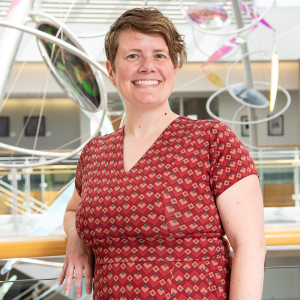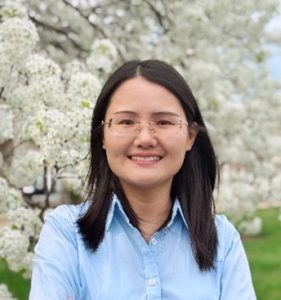Plant Stress

Jan. 7, 2026
Jagdeep Singh Sidhu
Sidhu grew up on a small farm in Punjab, India, an experience that continues to shape his approach to agricultural research. Motivated by practical challenges faced by farmers, his work integrates fundamental plant biology with applied breeding to improve crop resilience. His training spans crop breeding and genetics, root biology, and in silico modelling. Educational Background Ph.D. Pennsylvania State University…

June 24, 2025
Erin Sparks
Sparks holds a joint appointment with the University of Missouri and the Donald Danforth Plant Science Center. She is passionate about interdisciplinary approaches to solve complex challenges. Her background training includes a B.S. in Biomedical Engineering, a Ph.D. in Cell and Developmental Biology and postdoctoral work in Plant Molecular Biology. Educational background Ph.D., Vanderbilt University…

March 31, 2025
Xiaoping Xin
Dr. Xin’s research focuses on soil biogeochemistry processes, climate-resilient soil management, soil remediation, soil-plant interactions, crop production, precision agriculture, nanotechnology-enabled agriculture, and environmental risk assessment. She is committed to bridging the gap between academic research and practical agricultural applications, aiming to lead innovative studies in soil fertility and plant nutrition that enhance agricultural productivity and environmental sustainability in Missouri and beyond. Educational background Ph.D., University of Florida, 2020 Ph.D., Southwest University, China, 2017 B.S., Northwest A&F University, China, 2012 Courses taught Soil and the Environment (SOIL 3290) Soil Fertility and Plant Nutrition (SOIL 4313/7313) Soil Fertility and Plant Nutrition Lab…

July 31, 2024
Joseph H. Lynch
Dr. Lynch grew up in rural Washington State and received his BS in Biology from Gonzaga University. He then earned his PhD from Washington State University in the Molecular Plant Sciences program, with his graduate research in the lab of Dr. Sanja Roje focusing on the metabolism of flavin cofactors. After completion of his degree, he took a postdoctoral position in Dr. Natalia Dudareva’s lab at Purdue University studying the production and release of phenylpropanoid/benzenoid volatiles in plants. During his postdoc, he helped elucidate a cytosolic pathway for synthesis of the amino acid phenylalanine in plants that operates in parallel…

Aug. 31, 2023
Jasmine Neupane
Jasmine Neupane is an Assistant Professor of Agricultural Systems Technology in the Division of Plant Science and Technology. Her faculty appointment includes research and teaching responsibilities in Plant Science and Technology. Before starting her position at University of Missouri-Columbia, Neupane was serving as an Assistant Research Professor of Precision Agriculture at Montana State University. Neupane’s research is at the forefront of agricultural innovation, focusing on seamless integration of advanced agricultural technologies into cropping systems. Her work is driven by a deep commitment to addressing the complex challenges facing modern agriculture, such as increasing food production to feed a growing…

April 5, 2023
Andre Froes de Borja Reis
Andre FB Reis is the statewide specialist in soybean farming systems and joined the division of Plant Science and Technology in 2023. Educational background Ph.D., Crop Science, University of Sao Paulo (Brazil) M.S., Crop Science, Federal University of Tocantins (Brazil) B.S., Agronomy, University of Sao Paulo (Brazil)…

Oct. 13, 2022
Peng Tian
Tian has an extension appointment in plant disease diagnosis. His responsibilities include management of Plant Diagnostic Clinic at University of Missouri and participation in Missouri Integrated Pest Management program and National Plant Diagnostic Network. His extension program provides identification services of plant disease, weed and insect as well as disease management recommendations to growers, agricultural professionals, agribusinesses, and the various commodity groups in the state. His research program focuses on identification of new plant diseases and development of innovative assays to characterize and differentiate viral and fungal pathogens in specialty crops to address current plant health problems and ensure the…

Feb. 21, 2022
Sam Lord
Educational background Ph.D. , University of Missouri, Natural Resources – Emphasis in Soil M.S., University of Missouri, Natural Resources – Emphasis in Soil B.S. 2016, University of Missouri, Soil, Environmental, and Atmospheric Sciences – Emphasis in Soil Courses taught Soil 2100 Lecture: Introduction to Soil Science Soil 4308/7308: Soil Conservation Soil 4312/7312: Environmental Soil Microbiology…

June 30, 2021
Craig Schenck
To deal with relentless environmental pressures, plants produce an arsenal of structurally diverse defensive chemicals. These sometimes-complex compounds are derived from much simpler building blocks from primary metabolic pathways. Unlike well-documented diversification of plant specialized metabolic enzymes, core metabolic pathways are highly conserved and evolutionarily constrained because they serve essential metabolic functions, which makes manipulation of these pathways difficult. The expansion and alteration of core metabolism has given rise to the evolution of structurally diverse plant specialized metabolites. However, the underlying mechanisms enabling metabolic diversity and the connections linking core to specialized metabolism are not well known. These knowledge gaps…

April 5, 2021
Heike Buecking
Plants are metaorganisms that engage in intimate associations with a wide diversity of microorganisms. Many of these microorganisms are beneficial and help plants to overcome a variety of abiotic and biotic stresses. In our research, we focus particularly on arbuscular mycorrhizal (AM) fungi and nitrogen fixing rhizobia bacteria. AM fungi played a significant role during land plant evolution and form close interactions with the roots of 70% of land plants, including many agronomically important species, such as corn, soybean, or wheat. AM fungi increase the nutrient acquisition of for example phosphate, nitrogen, sulfur, and potassium from the soil, and improve…